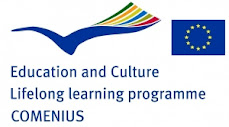ITALY: from 2 to 7 of October 2011 we visited the Kinderhaus in Maintal
Teachers:
-Imelde Losi
-Giulia Montanari-Gessica Di Giacinto
-Lucia Zani
-Simona MenozziPedagogical Coordinators:
-Patrizia Benedetti
-Alessandra FerrariCristian Fabbi, Director
Giammaria Manghi, Mayor of Poviglio
The Kinderhaus is a public school and consists of 5 sections that are aimed at children aged 3 to 11 years.
The children attending primary school have access to preschool from 7 to 8 a.m. and back from 13 to 17 .
The sections are differentiated depending on their specific nature of the following: art, music, pretend play, drama, research and forest group.
The children attending primary school have access to preschool from 7 to 8 a.m. and back from 13 to 17 .
The sections are differentiated depending on their specific nature of the following: art, music, pretend play, drama, research and forest group.
Each section has about 20 children of which 5/6 of primary school and two teachers with specialized studies in characterizing their own section.
Music section:
presence of multiple musical instruments

Art section: presence of a painting studio and various papers chromatically different

Drama section: puppets, marionettes and many disguises

Research section: light table, overhead and material for experiments with water

Pretend play section: section equipped with a real kitchen in which the group can cook
Forest Group: the forest as a space section

Working in a small group
Conclusion about focus of observation
What are the key ideas and choices on
the basis of our environmental planning?
a) Internal and external area
b) Organization of different spaces (corners)
c) Atelier
d) Material
In which way does the environment support children to experiment polisensoriality?
a) How can the environment stimulate the development of communication languages?
b) How can the organization of the environment influence the development of social skills?
In which way does the environment support children autonomies?
a) Self-confidence, wellness and a positive self-image
b) Relation between autonomies and cultural issues (rules, laws, parents-teachers ideas)
c) An adult that is in the proximal area of development (non-directive intervention)
d) Cognitive development (learning to learn)
e) Development of critical thinking (problem-solving in a social dimension)
The visit to Kinderhaus and in particular section forest group has generated in our team a deep reflection on our outside living space and and the autonomy that schools can and should support.
Thanks for giving us this opportunity





















Posta un commento